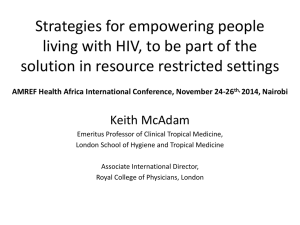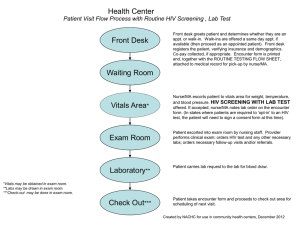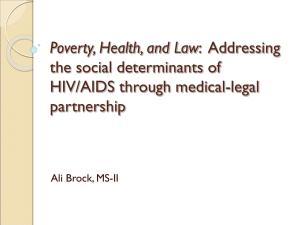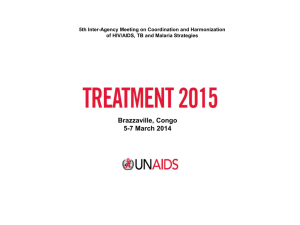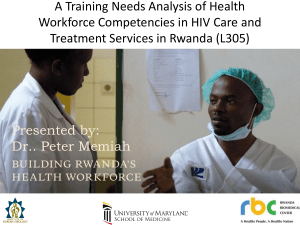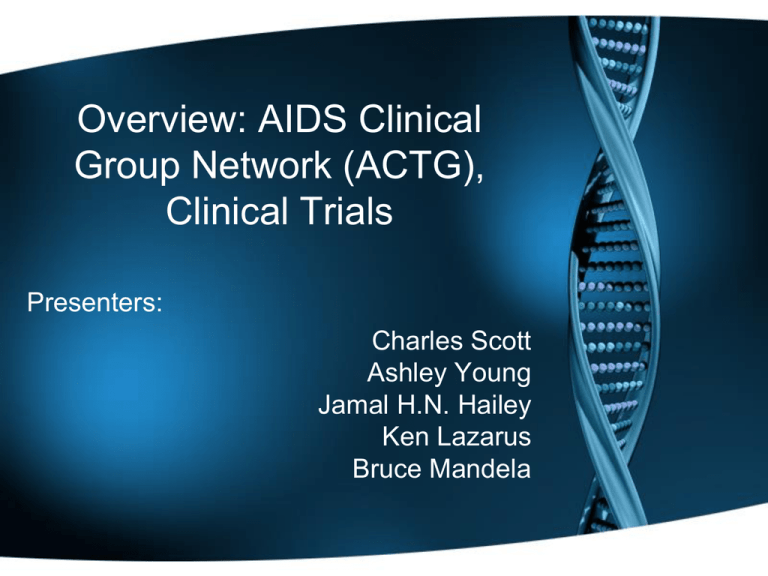
Overview: AIDS Clinical
Group Network (ACTG),
Clinical Trials
Presenters:
Charles Scott
Ashley Young
Jamal H.N. Hailey
Ken Lazarus
Bruce Mandela
AIDS Clinical trials group
HTTPS://ACTGNETWORKK.ORG
The mission of the AIDS Clinical Trials Group (ACTG) Network
is:
To develop and conduct scientifically rigorous translational
research and clinical trials to:
(1) investigate the viral and immune pathogenesis of HIV-1
infection and its complications;
(2) (2) evaluate novel drugs and strategies for treating HIV-1
infection;
(3) (3) evaluate interventions and strategies to treat and prevent
HIV-related co-infections and co-morbidity
(4) (4) publish and disseminate results to improve care, and
reduce or eliminate morbidity and mortality associated with
HIV-1 infection and its complications.
Categories of Trials
The AIDS Clinical Trials Group (ACTG) conducts a wide
range of studies for people infected with HIV. As a matter of
practice, the ACTG has developed a core group of ten
categories that comprise the bulk of the current trials that are
open to enrollment.
Categories include:
Treatment Naïve: Treatment Naïve refers to people who have never taken HIV
medications before. These studies are designed to help find out what treatments
or drugs work best as an initial regimen.
Treatment Experienced: Treatment Experienced refers to people who are
currently on medications or have taken medications in the past for HIV. Each
study has a unique approach: Which are the best medications to treat with? When
is the best time to change medications? How do we know when to change
medications?
Immunity Enhancers: HIV harms the immune system. These studies look at
innovative ways to help your immune system work better while continuing to treat
you with HIV medications.
Women: Women with HIV have unique gynecology, maternity, and metabolic
issues. These studies are dedicated to fostering the health of women.
Opportunistic Infections: When people with HIV have an additional infection like
cytomegalovirus or tuberculosis, there are important treatment questions and side
effects to look for. These studies are looking at that unique situation.
Categories continued:
Hepatitis: People with HIV may also be infected with Hepatitis. These
trials study the treatment of individuals with Hepatitis or individuals with
Hepatitis and HIV.
Neurologic Complications: HIV infection may cause nervous system
problems such as numbness and cognitive problems. These studies look
at treatments for the problems.
Side Effects: We know that many drugs used to successfully treat HIV
have side effects. The following studies look at ways to treat the most
common of these side effects.
Tuberculosis: People with HIV may also be infected with Tuberculosis.
These trials study the diagnosis and treatment of individuals with
Tuberculosis.
Non-Interventional: Studies in this section are those in which no
attempt is made to affect the outcome of HIV treatment, for example, no
treatment is prescribed or provided by the study. People who enter these
studies may be asked to provide blood or other biological specimens.
They may be asked to complete clinical evaluations and questionnaires.
The information from these studies might prove useful in evaluating
current or future treatment for people living with HIV.
A5128 and a5225
A5128: The study will seek Informed consent to use stored
specimens for currently unspecified/ genetic analyses.
Goal: To develop a standard operating procedure to establish
a storage bank for specimens for future genetic (DNA)
analyses.
A5225: A phase I/II study will compare the standard
treatment for CM, amphotericin B with or without flucytosine
for 2 weeks, followed by fluconazole for several months to
fluconazole only.
Goal: To find out whether some dose of oral fluconazole
might be as safe and effective as amphotericin B for the
treatment of CM.
A5243 AND A5250
A5243: a study to collect blood and saliva samples from former
and current participants in AIDS Clinical Trial Group (ACTG)
studies at non-U.S. sites.
Goal: All samples will be stored for future HIV-related genetic
testing. Approval both by the ACTG and by site Ethics
Committees will be sought before their use.
A5250: Durability of Adherence in Self-Management of HIV
(DASH)
Stage 1: Participation of enrollees in focus groups to best adapt
the Client Adherence Profiling and Intervention Tailoring (CAPIT) intervention to treatment-naïve participants initiating therapy.
Stage 2: Random assignment of HAART naïve individuals to be
initiated to either a group that will receive the standard
adherence counseling or individualized adherence selfmanagement training.
Goal: To learn if individualized adherence self-management
training helps HIV-infected individuals take their HIV medicines
more consistently and stay on their medication regimens for
longer periods.
A5264 and A5271
A5264: Compares the effectiveness and safety of ART alone to
ART combined with an anti-cancer drug for initial treatment of
AIDS related Kaposi’s sarcoma in untreated individuals who
haven’t received ART.
Goal: ART has been shown helpful in treating KS as well as HIV.
It’s designed to help us treat HIV/AIDS related KS in resource
limited areas of the world.
A5271: Study of healthy HIV-negative people in resource-limited
settings. HIV infected people who have started HAART within the
last year will participate in focus groups to determine what is
needed to help them adhere to regimen.
Goal: To learn if individual adherence training helps HIV infected
individuals take their HIV medications more consistently.
A5273 and A5274
A5273: HIV infected people and their current initial NNRTI
containing regimen. Study will compare 2 second line regimens,
lopinavir/ritonavir plus raltegravir(LPV/r+RAL) vs LPV/r plus best
available NRTIs.
Goal: Compare two second line anti-HIV drug regimens to see
how well they fight HIV. Will study drug regimen tolerance and
their safety.
A5274: 2-year study that will test a strategy for reducing early
deaths and severe illness among people who are starting HIV
treatment in areas with high rates of TB infection.
Goal: Whether people living in areas where the rate of TB
infection is high, is it better to start anti-TB treatment when they
start anti-HIV treatment even though they don’t appear to have
TB or if anti-TB treatment should only be started if TB infection is
present. Bb
A5279 and A5282
A5279: a study comparing the rifapentine plus isoniazid daily for
4 weeks to a standard regimen of isoniazid alone daily for 9
months for the prevention of tuberculosis (TB) in HIV-infected
participants who do not show evidence of active TB.
Goal: to see which regimen is most effective in TB prevention.
A5282: a studying comparing two different methods to prevent
cancer of the cervix. Participants will be randomly assigned to one
of two different groups. Group 1 will receive cryotherpay and
group 2 will receive the standard procedures.
Goal: to see which treatment method works better at prevention
cervical cancer. This is a test and treat approach in which
participants will undgo biopsy.
A5288 and A5290
A5288: a study in resource-limited settings to see if HIV-infected
persons with two treatment failures will do better in the next
treatment if using blood test called a resistance.
Goal: The study will look at how well combinations of new anti-HIV
drugs work and if taking new anti-HIV drugs together is safe and
tolerable. Another question the study wants to answer is whether a
certain class of drugs, NRTIs is needed with other anti-HIV drugs.
A5290: is a randomized, open-label study comparing three
regimens among participants in high TB areas and HIV treatment
that includes a protease inhibitor.
Goal: To find a safe and effective treatment for TB in persons living
with HIV that contains a protease inhibtor.
A5294 and A5296
A5294: Research study for people infected with both HIV and
Hepatitis C.
Goal: Will see if adding third drug BOC to the standard PEG-IFN
and RBV is safe and if it will help people with both HIV and HCV
better fight HCV.
A5296:Sevelamer carbonate will be studied to see how well the
drug reduces endotoxin levels and activation of the immune
system in people infected with HIV.
Goal:See if its possible to reduce the effects of product in the
blood and reduce immune activation.
A5298
• A5298: Study of HPV vaccine or placebo in HIV infected men
who have sex with men to see if the vaccine prevents
persistent anal HPV infection.
• Goal: Learn if HPV vaccine prevents persistent anal infection
with the four HPV types contained in the vaccine.
A5303: Bone, Immunologic, and
Virologic Effects of an ARV Regimen
Study Description:
A5303 is a study for people who are infected with the
R5 type of HIV virus and have never taken HIV
medications.
Participants will receive either an experimental regimen
(maraviroc [MVC] + emtricitabine [FTC] + darunavir
[DRV] + ritonavir [RTV] once-daily) or a standard
regimen (tenofovir [TDF] + FTC + DRV + RTV oncedaily) for 48 weeks.
A5303 (CONTINUED)
Study Goals:
The main purpose of the study is to compare the effects of the
regimens on bone mineral density (BMD) as measured by a DXA
bone scan in patients who have never taken HIV medications.
(This study is targeted at the Treatment Naïve population.)
The study will also compare the effects of the study drug
regimens on changes in the immune system, kidney, bone, and
neurocognitive function. Safety and tolerability of the study drugs
and any changes or resistance that occurs in the HIV virus will
also be evaluated.
A5303 (CONTINUED)
Of the more than 47 ACTG sites conducting this study, included
are my site in Atlanta, Georgia,
• The Ponce de Leon Center (Emory University) and
• the University of California, Los Angeles CARE Center CRS
A5306: Safety and Drug Interaction
Study of PA-824 together with
Select Drugs for the Treatment of
HIV or Tuberculosis
Study Description
This is a study in healthy HIV-negative participants to look
at interactions and safety of different drug combinations:
PA-824 (a new anti-tuberculosis drug) and efavirenz (EFV),
lopinavir/ritonavir (LPV/r) [approved anti-HIV drugs] or
rifampin (RIF) (an approved anti-tuberculosis drug).
Why is this study being done?
To measure the combination of two medications at different
times in the blood and to see how safe and easy they are to
take together.
A5308: Open-Label Study to Evaluate
the Effect of Fixed-Dose COMPLERA
(Emtricitabine/Rilpivirine/Tenofovir Disoproxil
Fumarate) in Treatment-Naïve HIV-1
Controllers
• Study Description
A5308 is a study for HIV-infected individuals who have low
HIV-1 viral loads (less than 500 copies) and have never taken
HIV medications. These individuals, who are called HIV
controllers, do not show any signs of having HIV and are
doing well without taking HIV medication. All participants will
receive fixed-dose Complera (brand name) for 48 weeks and
will then be given the choice to continue taking Complera or
stop taking the medication.
• Study Goals
The purpose of this study is to see if taking HIV medication
will reduce immune activation (body’s way of fighting disease)
in people who have HIV but do not show symptoms. An
optional viral decay component will help determine how
quickly HIV-1 virus is eliminated from the blood after starting
medication.
A5308 (CONTINUED)
Of the more than 31 ACTG sites conducting this study,
included are my site in Atlanta, Georgia,
The Ponce de Leon Center (Emory University) and
the University of California, Los Angeles CARE Center
CRS
References Page
All information was taken from AIDS Clinical Trails Group webpage.
-https://actgnetwork.org/open_and_enrolling_studies


